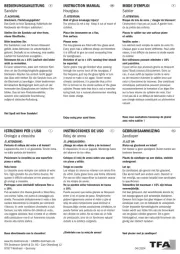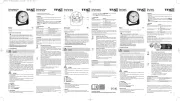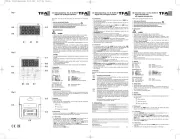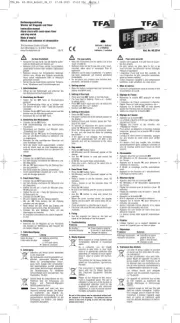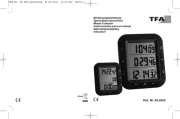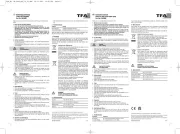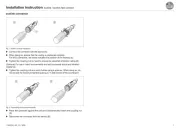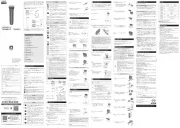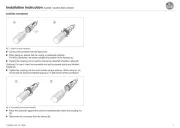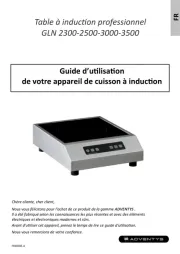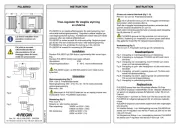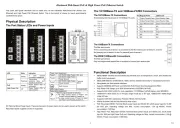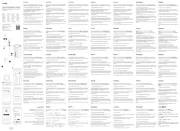
• Das eigenmächtige Reparieren, Umbauen oder Verändern des Gerätes ist nicht
• Halten Sie das Gerät und die Batterie außerhalb der Reichweite von Kindern.
• Kleinteile können von Kindern (unter drei Jahren) verschluckt werden.
• Batterien enthalten gesundheitsschädliche Säuren und können bei Verschlucken
lebensgefährlich sein. Wurde eine Batterie verschluckt, kann dies innerhalb von
2 Stunden zu schweren inneren Verätzungen und zum Tode führen. Wenn Sie
vermuten, eine Batterie könnte verschluckt oder anderweitig in den Körper
gelangt sein, nehmen Sie sofort medizinische Hilfe in Anspruch.
• Batterien nicht ins Feuer werfen, kurzschließen, auseinandernehmen oder aufla-
• Um ein Auslaufen der Batterie zu vermeiden, sollten schwache Batterien mög-
lichst schnell ausgetauscht werden. Achten Sie auf die richtige Polarität beim
Einlegen der Batterie. Entfernen Sie die Batterie, wenn Sie das Gerät längere
Zeit nicht verwenden. Sollte eine Batterie ausgelaufen sein, vermeiden Sie Kon-
takt mit Haut, Augen und Schleimhäuten. Spülen Sie ggf. umgehend die betrof-
fenen Stellen mit Wasser und suchen Sie einen Arzt auf.
Wichtige Hinweise zur Produktsicherheit!
• Setzen Sie das Gerät keinen extremen Temperaturen, Vibrationen und Erschüt-
• Reinigen Sie das Gerät mit einem weichen, leicht feuchten Tuch. Keine Scheuer-
oder Lösungsmittel verwenden!
• Das Gerät ist nur für den Betrieb in Innenräumen geeignet. Vor Feuchtigkeit
Hinweis: Drücken Sie die Tasten mit einem spitzen Gegenstand.
• Legen Sie eine neue Batterie 1,5 V AA ein, +/- Pol wie abgebildet.
• Das Gerät ist jetzt betriebsbereit.
• Die Zeiger stellen sich auf 12 h und die Funkuhr versucht nun 3 bis 15 Minuten
lang, das Funksignal zu empfangen. Wenn der Zeitcode nach einigen Minuten
empfangen wurde, stellen sich die Zeiger automatisch auf die aktuelle Zeit ein.
• DCF-Empfangsversuche finden bis zu 8-mal täglich automatisch statt.
• Sie können den DCF-Funkempfang auch manuell aktivieren. Halten Sie die REC
Taste für drei Sekunden gedrückt.
• Die Zeiger stellen sich dann auf 12 h und die Funkuhr startet einen neuen Ver-
such, das Funksignal zu empfangen.
• Falls die Funkuhr kein DCF-Signal empfangen kann (z.B. wegen Störungen,
Übertragungsdistanz, etc.), kann die Zeit manuell eingestellt werden.
5.2 Manuelle Einstellung der Uhrzeit
• Halten Sie die Taste für 4 Sekunden gedrückt SET
• Halten Sie nun die Taste gedrückt, bis die aktuelle Uhrzeit angezeigt wird.SET
• Drücken Sie die Taste nur kurz, rücken die Zeiger eine Minute vor.SET
• Warten Sie 8 Sekunden, das Gerät übernimmt dann automatisch die Einstellung.
• Bei erfolgreichem Empfang des DCF-Signals wird die manuell eingestellte Zeit
5.3 Hinweis: Empfang der Funkzeit
• Die Zeitübertragung erfolgt von einer Atomuhr in der Nähe von Frankfurt am
Main durch ein DCF-77 (77.5 kHz) Frequenzsignal mit einer Reichweite von ca.
1.500 km. Ihre Funkuhr empfängt das Signal, wandelt es um und zeigt immer
die exakte Zeit an. Auch die Umstellung von Sommer- und Winterzeit erfolgt
• Vermeiden Sie die Nähe zu möglichen Störquellen, die den Funkempfang beein-
trächtigen können Es wird empfohlen, einen Abstand von mindestens 2 Metern
zu eventuell störenden Geräten (Fernseher, Computer, Mikrowelle, Funktelefone,
Babyfon) und großen Metallgegenständen (z.B. Kühlschrank) einzuhalten. Bei
massiven Wänden, insbesondere mit Metallteilen, kann sich die Sendereichwei-
te erheblich reduzieren. In Extremfällen wird empfohlen, das Gerät in Fenster-
Vielen Dank, dass Sie sich für dieses Gerät aus dem Hause TFA entschieden
Bevor Sie mit dem Gerät arbeiten
Lesen Sie sich bitte die Bedienungsanleitung genau durch.
Die Bedienungsanleitung liegt dem Gerät bei oder zum Download unter
www.tfa-dostmann.de/service/downloads/anleitungen
Verwenden Sie das Gerät nicht anders, als in der Anleitung dargestellt wird.
Durch die Beachtung der Bedienungsanleitung vermeiden Sie auch
Beschädigungen des Gerätes und die Gefährdung Ihrer gesetzlichen Män-
gelrechte durch Fehlgebrauch.
Beachten Sie besonders die Sicherheitshinweise!
Bewahren Sie die Bedienungsanleitung gut auf!
Thank you for choosing this instrument from TFA.
Before you use this product
Please make sure you read the instruction manual carefully.
The operating instructions are enclosed with the device or can be down-
www.tfa-dostmann.de/en/service/downloads/instruction-manuals
This product should only be used as described within these instructions.
Following and respecting the instructions in your manual will prevent dama-
ge to your instrument and loss of your statutory rights arising from defects
Please take particular note of the safety advice!
Please keep this instruction manual safe for future reference.
Nous vous remercions d'avoir choisi l'appareil de la société TFA.
Avant d'utiliser votre appareil
Veuillez lire attentivement le mode d'emploi.
Le mode d'emploi est joint à l'appareil ou peut être téléchargé à l'adresse
www.tfa-dostmann.de/en/service/downloads/instruction-manuals
N'utilisez jamais l’appareil à d'autres fins que celles décrites dans le pré-
En respectant ce mode d'emploi, vous éviterez d'endommager votre appa-
reil et de perdre vos droits légaux en cas de défaut si celui-ci résulte d’une
utilisation non-conforme.
Suivez bien toutes les consignes de sécurité !
Conservez soigneusement le mode d'emploi !
Vi ringraziamo per aver scelto l'apparecchio della TFA.
Prima di utilizzare l'apparecchio
Leggete attentamente le istruzioni per l'uso.
Le istruzioni per l'uso sono allegate all'apparecchio o possono essere sca-
www.tfa-dostmann.de/en/service/downloads/instruction-manuals
Non utilizzate il prodotto in maniera diversa da quanto descritto in queste
Seguendo le istruzioni per l'uso, eviterete anche di danneggiare il prodotto
e di pregiudicare, a causa di un utilizzo scorretto, i diritti del consumatore
che vi spettano per legge.
Prestate particolare attenzione alle misure di sicurezza!
Conservate con cura le istruzioni per l'uso.
• Nachts sind die atmosphärischen Störungen meist geringer. Ein einziger Emp-
fang pro Tag genügt, um die Genauigkeit (±1 Sekunde) zu gewährleisten.
Hängen Sie die Funkuhr mit einem stabilen Nagel oder einer Schraube mit Dübel
sicher an der Aufhängevorrichtung auf. Stellen Sie vor der endgültigen Montage
sicher, dass ein Empfang des DCF-Signals am gewünschten Aufstellort möglich
Keine Zeigerbewegung Batterie polrichtig einlegen➜
Kein DCF Empfang Taste für 3 Sekunden drücken und Funk-➜ REC
empfang manuell aktivieren
➜ Empfangsversuch in der Nacht abwarten
➜ Anderen Aufstellort für das Gerät wählen
➜ Uhrzeit manuell einstellen
➜ Beseitigen der Störquellen
➜ Neuinbetriebnahme des Gerätes gemäß
Unkorrekte Anzeige ➜ RESET Taste drücken
Wenn Ihr Gerät trotz dieser Maßnahmen immer noch nicht funktioniert, wenden
Sie sich an den Händler, bei dem Sie das Produkt gekauft haben.
Dieses Produkt und die Verpackung wurden unter Verwendung hochwertiger
Materialien und Bestandteile hergestellt, die recycelt und wiederverwendet werden
können. Dies verringert den Abfall und schont die Umwelt.
Entsorgen Sie die Verpackung umweltgerecht über die eingerichteten Sammel-
Entsorgung des Elektrogeräts
Entnehmen Sie nicht festverbaute Batterien und Akkus aus dem Gerät
und entsorgen Sie diese getrennt.
Dieses Gerät ist entsprechend der EU-Richtlinie über die Entsorgung von
Elektro- und Elektronik-Altgeräten (WEEE) gekennzeichnet.
Dieses Produkt darf nicht mit dem Hausmüll entsorgt werden. Der Nutzer
ist verpflichtet, das Altgerät zur umweltgerechten Entsorgung bei einer
ausgewiesenen Annahmestelle für die Entsorgung von Elektro- und Elek-
tronikgeräten abzugeben. Die Rückgabe ist unentgeltlich. Beachten Sie
die aktuell geltenden Vorschriften!
Batterien und Akkus dürfen keinesfalls in den Hausmüll. Sie enthalten
Schadstoffe, die bei unsachgemäßer Entsorgung der Umwelt und der
Gesundheit Schaden zufügen können. Als Verbraucher sind Sie gesetzlich
verpflichtet, gebrauchte Batterien und Akkus zur umweltgerechten Ent-
sorgung beim Handel oder entsprechenden Sammelstellen gemäß natio-
nalen oder lokalen Bestimmungen abzugeben. Die Rückgabe ist unent-
Die Bezeichnungen für enthaltene Schwermetalle sind:
Cd=Cadmium, Hg=Quecksilber, Pb=Blei.
Spannungsversorgung: Batterie 1 x 1,5V AA (nicht inklusive)
Gehäusemaße: Ø 245 x 42 mm
Gewicht: 455 g (nur das Gerät)
Diese Anleitung oder Auszüge daraus dürfen nur mit Zustimmung von TFA Dostmann veröffentlicht
werden. Die technischen Daten entsprechen dem Stand bei Drucklegung und können ohne vorherige
Benachrichtigung geändert werden. Die neuesten technischen Daten und Informationen zu Ihrem Pro-
dukt finden Sie auf unserer Homepage unter Eingabe der Artikel-Nummer in das Suchfeld.
Hiermit erklärt TFA Dostmann, dass der Funkanlagentyp 60.3550 der Richtlinie 2014/53/EU ent-
spricht. Der vollständige Text der EU-Konformitätserklärung ist unter der folgenden Internetadresse
verfügbar: www.tfa-dostmann.de/service/downloads/ce
E-Mail: info@tfa-dostmann.de
TFA Dostmann GmbH & Co.KG, Zum Ottersberg 12, 97877 Wertheim, Deutschland 05/23
• Unauthorized repairs, alterations or changes to the product are prohibited.
• Keep this device and the battery out of reach of children.
• Small parts can be swallowed by children (under three years old).
• Batteries contain harmful acids and may be hazardous if swallowed. If a battery
is swallowed, this can lead to serious internal burns and death within two
hours. If you suspect a battery could have been swallowed or otherwise caught
in the body, seek medical help immediately.
• Batteries must not be thrown into a fire, short-circuited, taken apart or
recharged. Risk of explosion!
• Low batteries should be changed as soon as possible to prevent damage
caused by leaking. Make sure the polarities are correct. Remove the battery if
you do not use the device for a long period of time. Avoid contact with skin,
eyes and mucous membranes when handling leaking batteries. In case of con-
tact, immediately rinse the affected areas with water and consult a doctor.
Important information on product safety!
• Do not expose the device to extreme temperatures, vibrations or shocks.
• Clean the device with a soft damp cloth. Do not use solvents or scouring
• The device is only suitable for indoor use. Protect it from moisture!
Note: Press the buttons using a pin.
• Insert a new battery AA 1,5 V with the correct polarity (+/-).
• The device is ready for use.
5.1 Radio-controlled time reception
• The clock hands now travel to 12 o'clock automatically and the radio-controlled
clock tries to receive the radio signal for 3 - 15 minutes. When the time code
has been received after a few minutes, the clock hands automatically adjust to
• DCF radio reception attempts take place automatically up to 8 times a day.
• You can also activate the DCF reception manually. Press and hold the REC
button for three seconds.
• The clock hands will then move to 12 o'clock and the clock tries to receive the
• If the clock cannot detect the DCF-signal (e.g. due to interference, transmitting
distance, etc.), the time can be set manually.
• Press and hold the button for 4 seconds.SET
• Press and hold the button until the desired time is indicated.SET
• Press the button briefly. The clock hands move forward minute by minute. SET
• Wait 8 seconds, the unit will save the setting automatically.
• The manually set time is overwritten once the DCF time signal is successfully
5.3 Note on radio-controlled time
• The time is transmitted from an atomic clock near Frankfurt am Main by a DCF-
77 (77.5 kHz) frequency signal with a range of about 1,500 km. Your radio-con-
trolled clock receives the signal, converts it and always shows the exact time.
The adjustment of Daylight-Saving Time and Standard Time is also automatic.
• Avoid being close to possible sources of interference that may affect radio
reception. It is recommended to keep a distance of at least 2 metres to possibly
interfering sources (TV, computer, microwave, wireless phones, baby monitors)
and large metal objects (e.g. refrigerator). Within solid walls, especially ones
with metal parts, the transmission range can be reduced considerably. In
extreme cases, please place the unit close to a window to improve reception.
• During night-time, the atmospheric interference is usually less severe. A single
daily reception is adequate to keep the accuracy deviation under 1 second.
Securely attach the device with a solid nail or a screw and dowel at the respective
location using the wall mounting hole. Before the final installation, make sure that
the reception of the DCF time signal is possible.
Clock hands do not move Ensure that the battery polarity is correct➜
No DCF reception Press and hold the button for three seconds ➜ REC
and activate the reception manually
➜ Wait for an attempt reception during the night
➜ Choose another place for your device
➜ Check if there is any source of interference
➜ Restart the device according to the manual
Incorrect indication button ➜ Press the RESET
If your device fails to work despite these measures, contact the retailer where you
This product and its packaging have been manufactured using high-grade materi-
als and components which can be recycled and reused. This reduces waste and
protects the environment.
Dispose of the packaging in an environmentally friendly manner using the collec-
tion systems that have been set up.
Disposal of the electrical device
Remove non-permanently installed batteries and rechargeable batteries
from the device and dispose of them separately.
This product is labelled in accordance with the EU Waste Electrical and
Electronic Equipment Directive (WEEE).
This product must not be disposed of in ordinary household waste. As a
consumer, you are required to take end-of-life devices to a designated
collection point for the disposal of electrical and electronic equipment, in
order to ensure environmentally-compatible disposal. The return service
is free of charge. Observe the current regulations in place!
Disposal of the batteries
Never dispose of empty batteries and rechargeable batteries with ordi-
nary household waste. They contain pollutants which, if improperly dis-
posed of, can harm the environment and human health. As a consumer,
you are required by law to take them to your retail store or to an appro-
priate collection site depending on national or local regulations in order
to protect the environment. The return service is free of charge.
The symbols for the contained heavy metals are:
Cd=cadmium, Hg=mercury, Pb=lead.
Power consumption: Battery 1 x AA 1,5 V (not included)
Housing dimension: Ø 245 x 42 mm
Weight: 455 g (device only)
No part of this manual may be reproduced without written consent of TFA Dostmann. The technical
data are correct at the time of going to print and may change without prior notice. The latest technical
data and information about this product can be found in our homepage by simply entering the prod-
uct number in the search box.
EU Declaration of conformity
Hereby, TFA Dostmann declares that the radio equipment type 60.3550 is in compliance with Directive
2014/53/EU. The full text of the EU declaration of conformity is available at the following internet
address: www.tfa-dostmann.de/service/downloads/ce
E-Mail: info@tfa-dostmann.de
TFA Dostmann GmbH & Co.KG, Zum Ottersberg 12, 97877 Wertheim, Germany 05/23
• Vous ne devez en aucun cas réparer, démonter ou modifier l'appareil par vous-
• Placez votre appareil et la pile hors de la portée des enfants.
• Les petites pièces peuvent être avalées par les enfants (de moins de trois ans).
• Les piles contiennent des acides nocifs pour la santé et peuvent être mortelles
dans le cas d’une ingestion. Si une pile a été avalée, elle peut entraîner des brû-
lures internes graves ainsi que la mort dans l’espace de 2 heures. Si vous crai-
gnez qu’une pile ait pu être avalée ou ingérée d’une autre manière, quelle qu’elle
soit, contactez immédiatement un médecin d’urgence.
• Ne jetez jamais de piles dans le feu, ne les court-circuitez pas, ne les démontez
pas et ne les rechargez pas. Risque d'explosion !
• Une pile faible doit être remplacée le plus rapidement possible afin d'éviter
toute fuite. Veillez à la bonne polarité des piles. Retirez la pile si vous n'utilisez
pas votre appareil pendant une durée prolongée. Évitez tout contact de la peau,
des yeux et des muqueuses avec le liquide des piles. En cas de contact, rincez
immédiatement les zones concernées à l’eau et consultez un médecin.
Conseils importants de sécurité du produit !
• Évitez d’exposer l’appareil à des températures extrêmes, à des vibrations ou à
• Pour le nettoyage de votre appareil, utilisez un chiffon doux et humide. N’utili-
sez pas de solvants ou d'agents abrasifs !
• L'appareil est conçu pour fonctionner uniquement à l'intérieur. Protégez l'appa-
Remarque : Appuyez sur les touches à l’aide d’un objet pointu.
• Insérez une nouvelle pile de type 1,5 V AA, polarité +/- selon l'illustration.
• Votre appareil est maintenant prêt à fonctionner.
5.1 Réception de l'heure radio
• Les aiguilles se placent maintenant automatiquement sur 12 h et l’horloge
essaie de recevoir le signal radio pendant 3 à 15 minutes.
• En cas de réception correcte, les aiguilles s'ajustent automatiquement à l'heure
• Les tentatives de réception DCF ont lieu automatiquement jusqu'à 8 fois par jour.
• Vous pouvez activer manuellement la réception de l’heure radio. Appuyez sur la
touche pendant trois secondes.REC
• Les aiguilles de l'horloge se déplacent à nouveau à 12 h et la tentative de récep-
• Si votre horloge radio-pilotée ne peut pas recevoir le signal DCF (par exemple
en cas de perturbations, d'une distance de transmission excessive etc.), vous
pouvez régler l'horaire manuellement.
5.2 Réglage manuel de l'heure
• Appuyez sur la touche pendant 4 secondes.SET
• Maintenez la touche appuyée jusqu'à ce que l'heure correcte soit affichée. SET
• Appuyez sur la touche brièvement et l’aiguille avancera d’une minute. SET
• Attendez 8 secondes pour confirmer l'entrée.
• Lorsque la réception du signal DCF a abouti, l'heure ajustée manuellement sera
remplacée par l’heure radio.
5.3 Consignes pour la réception de l'heure radio
• La transmission de l’heure radio s’effectue via une horloge atomique près de
Francfort-sur-le-Main, avec un signal DCF-77 (77,5 kHz) d'une portée d’environ
1 500 km. Votre horloge radio-pilotée reçoit le signal, le convertit et affiche
l'heure précise. Le passage de l'heure d'hiver à l'heure d'été et vice-versa
s'effectue également automatiquement.
• Évitez la proximité de sources parasites qui pourraient affecter la réception radio.
Il est recommandé de maintenir une distance d'au moins 2 mètres entre l'appareil
et les sources d'interférences (TV, ordinateur, micro-ondes, radiotéléphones,
babyphones) et les objets métalliques volumineux (par exemple, le réfrigérateur).
Si les murs sont massifs, en particulier s'ils comportent des parties métalliques,
la portée d'émission peut se trouver réduite considérablement. Dans les cas
extrêmes, nous vous conseillons de placer l’appareil près d’une fenêtre.
• La nuit, les perturbations s’affaiblissent en règle générale. Une seule réception
par jour suffit pour maintenir d’éventuels écarts en dessous d'1 seconde.
L'appareil peut être accroché au mur de la pièce à l'aide d'un clou solide ou d'une
vis et d'une cheville. Avant l'installation finale, assurez-vous que la réception du
signal DCF est possible à l'endroit où vous souhaitez l'installer.
Aucun mouvement Contrôlez la bonne polarité de la pile➜
des aiguilles Changez la pile ➜
Aucune réception de DCF Appuyez sur la touche pendant trois ➜ REC
secondes pour activer la réception radio
➜ Attendez la réception du signal de nuit
➜ Choisissez une autre position pour votre
➜ Réglez l'heure manuellement
➜ Éliminez les sources de parasitage
➜ Effectuez une remise en service, conformément
Affichage incorrecte Appuyez sur la touche ➜ RESET
Si votre appareil ne fonctionne toujours pas malgré ces mesures, adressez-vous
au vendeur chez qui vous l'avez acheté.
8. Traitement des déchets
Ce produit et son emballage ont été fabriqués avec des matériaux de haute qualité
qui peuvent être recyclés et réutilisés. Cela permet de réduire les déchets et de
protéger l’environnement.
Éliminez les emballages de manière respectueuse de l'environnement par le biais
des systèmes de collecte établis.
Mise au rebut de l'appareil électrique
Retirez de l'appareil les piles et les batteries rechargeables qui ne sont
pas installées de façon permanente et jetez-les séparément.
Cet appareil est conforme aux normes de l'UE relatives au traitement des
déchets électriques et électroniques (WEEE).
L'appareil usagé ne doit pas être jeté dans les ordures ménagères. L’utilisa-
teur s’engage, pour le respect de l’environnement, à déposer l’appareil usagé
dans un centre de traitement agréé pour les déchets électriques et électroni-
ques. La collecte est gratuite. Respectez les réglementations en vigueur !
Les piles et les batteries rechargeables ne doivent pas être jetées dans les
détritus ménagers. Elles contiennent des polluants qui peuvent nuire à
l'environnement et à la santé si elles sont éliminées de manière inappro-
priée. En tant qu'utilisateur, vous avez l'obligation légale de rapporter les
piles et les batteries rechargeables usagées à votre revendeur ou de les
déposer dans une déchetterie proche de votre domicile conformément à
la réglementation nationale et locale. La collecte est gratuite.
Les métaux lourds sont désignés comme suit :
Cd = cadmium, Hg = mercure, Pb = plomb.
9. Caractéristiques techniques
Alimentation : Pile 1 x 1,5 V AA (non incluse)
Dimensions du boîtier : Ø 245 x 42 mm
Poids : 455 g (appareil seulement)
La reproduction, même partielle, du présent mode d'emploi est strictement interdite sans l'accord
explicite de TFA Dostmann. Les caractéristiques techniques de ce produit ont été actualisées au
moment de l'impression et peuvent être modifiées sans avis préalable. Les dernières données techni-
ques et les informations concernant votre produit peuvent être consultées en entrant le numéro de
l'article sur notre site Internet.
Déclaration de conformité UE
Le soussigné, TFA Dostmann, déclare que l'équipement radioélectrique du type 60.3550 est conforme
à la directive 2014/53/UE. Le texte complet de la déclaration UE de conformité est disponible à
l'adresse Internet suivante : www.tfa-dostmann.de/service/downloads/ce
E-Mail: info@tfa-dostmann.de
TFA Dostmann GmbH & Co.KG, Zum Ottersberg 12, 97877 Wertheim, Allemagne 05/23
TFA_No. 60.3550_Anleitung 03.05.2023 13:43 Uhr Seite 1

